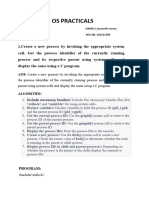0% found this document useful (0 votes)
36 views23 pagesOS LAB Programs - Colab
Operating System
Uploaded by
Vedant WarrierCopyright
© © All Rights Reserved
We take content rights seriously. If you suspect this is your content, claim it here.
Available Formats
Download as PDF, TXT or read online on Scribd
0% found this document useful (0 votes)
36 views23 pagesOS LAB Programs - Colab
Operating System
Uploaded by
Vedant WarrierCopyright
© © All Rights Reserved
We take content rights seriously. If you suspect this is your content, claim it here.
Available Formats
Download as PDF, TXT or read online on Scribd
/ 23
You might also like
- No ratings yetRaj Os Lab Manualjkkkkkkkkkkkkkkkkkkkkkkkkkkkkkkkkkkkkkkkkkkkkkkkkkkkkkkkkkkkkkkkkkkkkkkkkkkkkkkkkkkkkkkkkkkkkkkkkkkkkkkkkkkkkkgggggggggggggggggggggggggggggggggggggggggggggggggggggggggggggggggggggggggggggggggggggggggggggggggggggggggggggggggggggggggggggggggggggggggggggggggggggggggggggggggggggggggggggggggggggggggggg11321F005511321F005511321F005511321F005511321F005511321F005511321F005511321F005511321F005511321F005511321F005511321F005511321F005511321F005511321F005511321F005511321F005511321F005511321F005511321F005511321F005511321F005511321F005511321F005511321F005511321F005511321F005511321F005511321F005511321F005511321F005511321F005511321F005511321F005511321F005511321F005511321F005511321F005511321F005511321F005511321F005511321F005511321F005511321F005511321F005511321F005511321F005511321F005511321F005511321F005511321F005511321F005511321F005511321F005511321F005511321F005511321F005511321F005511321F005511321F005511321F005511321F005511321F005511321F005511321F005511321F005511321F005511321F00551132116 pages




























































































